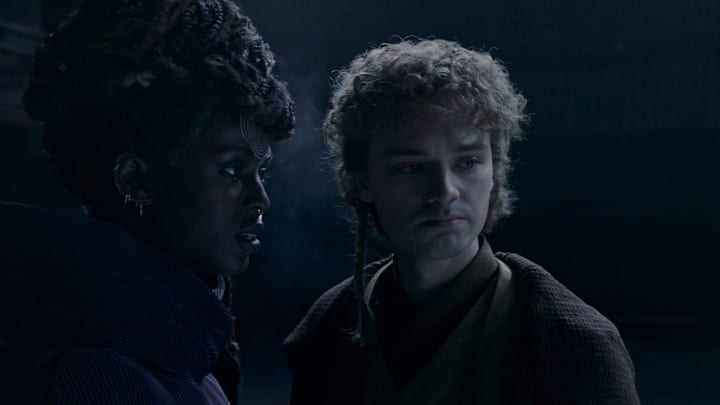The central mystery of The Acolyte, for me, has been less about the identity of the Sith Master and more about what happened that fateful night on Brendok. After all, it is at the heart of Mae's murderous quest and lays the groundwork for why Yord Fandar tells Osha that "Mae was always '[her] wound." Each of the Jedi involved has a different perspective on their responsibility for what happened and in this episode, we finally gain some insight into Torbin's guilt over what happened that night.
Torbin's Drive
In episode 2, "Revenge/Justice," Torbin took his own life as a sentencing for his complicity in the tragedy at Brendok. Episode 3, "Destiny," raised the question of whether Torbin's possession was related to his eventual suicide. In "Choice," the audience enters his mind at the moment of that possession and witnesses the ways in which Mother Aniseya tempts him.
The scene recalls Qimir describing how his cortosis helmet blocks his sight, so "It's just you and the Force. And what you bring with you." Aniseya lays bare Torbin's nature as someone who "has come so far, only to become trapped on this planet." She sees his wants and needs and, instead of rebuking him for acting in opposition to his master's wishes, identifies him as a "strong and good Jedi." It's similar to how Palpatine offered the dark side as a rational and inevitable way to resolve Anakin Skywalker's conflicts.
Aniseya goads him almost gently to reveal the heart's desire that she has perceived. In tears, Torbin first follows her command to ask her for help and then her order to kneel. At that point, we return to the perspective of the others in the courtyard, and Mother Aniseya sets a condition of departure for Torbin to return to his right mind. Because Indara, Kelnacca, and Sol have been blind to his torment and temptation of the preceding minutes, they don't realize the hold that the witches now have on his intentions.
Torbin's Flaw
From that moment onward, we see Torbin more openly fixated on things that will return him to Coruscant. He follows orders to test Mae and Osha's midichlorian count but advocates for putting distance between the twins and the coven. He asks again to be brought home to Coruscant when the request to bring Mae and Osha home is denied. When the Jedi realize that the girls weren't born naturally, he jumps at the conflict because "this is our ticket home." As they prepare for another confrontation, Sol tells him, "You cannot let them in your head again. Do you understand me?" Torbin proceeds with confidence because his "mind is fortified."
Torbin last hears Mother Koril's condemnation that he should not have brought the Jedi back and receives Indara's rebuke, "I warned you not to interfere." The guilt that Torbin now feels for the death of fifty women and (to his knowledge) one child leads him to take the Barash Vow. We know from episode 3 that he "will take no action on behalf of the Jedi Order," and this episode strongly implies that Torbin's Barash Vow was a result of the action he took while believing he did the right thing.
It is now easier to understand why Torbin chose the path of suicide when presented with the judgment against him. Not one of the Jedi sent to Brendok is spared from feeling guilt, but we will have to wait to see where the path of the remaining Jedi leads.
